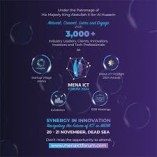On behalf of His Majesty King Abdullah II, Minister of Digital Economy and Entrepreneurship Sami Smeirat inaugurated the 10th Middle East and North Africa ICT Forum on Wednesday, hosted at the Dead Sea.
Organized by the Information and Communications Technology Association of Jordan (int@j) in collaboration with the Ministries of Digital Economy and Investment, the forum brings together regional and global leaders to explore opportunities for advancing the digital economy.
In his address, Smeirat underscored King Abdullah’s enduring vision of technology as a cornerstone of Jordan’s future. He noted the King’s early recognition of the role of digital innovation in fostering economic growth and his ambition to position Jordan as a regional hub for ICT.
Highlighting the country’s strategic location, political stability, skilled workforce, and supportive infrastructure, Smeirat emphasized these advantages as the foundation for achieving this vision.
The minister highlighted the government’s ongoing efforts to strengthen the sector, including fostering partnerships, enhancing legislative frameworks, and creating an environment conducive to investment and innovation.
He described the forum as a testament to Jordan’s commitment to playing a leading role in shaping the digital future of the region.
Smeirat acknowledged Jordan’s transformation over recent decades into a leader in ICT within the Middle East and North Africa, citing the country’s strong infrastructure, competitive edge, and the creativity of its talent. This growth has attracted global technology companies, many of which have established operations in the Kingdom.
He also reflected on Jordan’s pioneering role in entrepreneurship, noting the launch of the Arab world’s first business incubator in 2001 under the King’s direction, which laid the groundwork for many successful ventures with regional and global impact.
The minister pointed to Jordan’s progress in international rankings, including advances in e-government development, ICT readiness, and cybersecurity.
He celebrated the growth of early-stage entrepreneurship, which has propelled Jordan to 15th globally in entrepreneurship activity.
Such achievements, he noted, reinforce Jordan’s position as a regional leader in digital transformation and innovation.
Smeirat detailed key government initiatives driving the sector’s growth, such as the National Digital Transformation Strategy, the Artificial Intelligence Strategy, and efforts to digitize public services. The government has already achieved 60% digitalization of services, with plans to reach 100% by 2025.
The launch of 5G services, completion of a national fiber-optic network, and establishment of integrated service centers further reflect Jordan’s commitment to digital advancement.
The minister also highlighted the government’s efforts to equip Jordanian youth with advanced digital skills, noting programs such as the ICT Graduate Training and Employment Initiative and the Youth, Technology, and Jobs Program.
These efforts aim to bridge the skills gap, create job opportunities, and support startups, while positioning Jordan as a hub for tech investment through initiatives like Jordan Source, developed in collaboration with the Crown Prince’s Office and the World Bank.
Reflecting on the sector’s future, Smeirat outlined ambitious targets set by the Economic Modernization Vision, including tripling sector revenues and exports by 2033 and creating over 100,000 jobs.
He emphasized the role of tax incentives and other measures in attracting investment, further solidifying Jordan’s reputation as a regional technology leader.
Speaking at the event, int@j Chairman Amjad Swais highlighted the transformative power of technology and the region’s untapped potential.
He called for greater collaboration between sectors and renewed efforts to support emerging talent, with a focus on empowering women and preparing the next generation for leadership roles.
Swais also emphasized the importance of cybersecurity and data protection as the region navigates the rapid changes brought about by technological advancements.
The forum, which runs for two days, offers a platform for dialogue, innovation, and collaboration, bringing together stakeholders from across the Middle East and North Africa to shape a more connected, secure, and innovative future.
